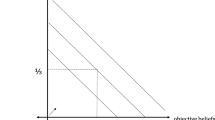Abstract
This article revisits the standard results of demand theory when the preference relation is a continuous preorder that admits an equicontinuous multi-utility representation. We study the consumer problem as the constrained maximization of a continuous vector-valued utility mapping, and show how to rederive those results. In particular, we provide a link between the literature on vector optimization and the analysis of the consumer problem under incomplete preferences.
Similar content being viewed by others
References
Aliprantis C., Border K. (1999) Infinite dimensional analysis (2nd ed.). Springer, Berlin
Aumann R. (1962) Utility theory without the completeness axiom. Econometrica 30: 445–462
Bewley, T. (1986). Knightian decision theory: Part I. Cowles Foundation Discussion Papers.
Bewley, T. (1987). Knightian decision theory: Part II. Intertemporal problems. Cowles Foundation Discussion Papers.
Bewley, T. (1989). Market innovation and entrepreneurship: A Knightian view. Cowles Foundation Discussion Papers.
Dubra J., Maccheroni F., Ok E. (2004) Expected utility theory without the completeness axiom. Journal of Economic Theory 115: 118–133
Eliaz K., Ok E. (2006) Indifference or indecisiveness? Choice theoretic foundations of incomplete preferences. Games and Economic Behavior 56: 61–86
Ellis D. (1976) A Slutsky equation for demand correspondences. Econometrica 44: 825–828
Evren, O., & Ok, E. (2007). On the multi-utility representation of preference relations. Manuscript.
Fuchs-Seliger S. (1990) Compensated and direct demand without transitive and complete preferences. Annals of Operations Research 23: 299–310
Ghirardato P., Maccheroni F., Marinacci M. (2004) Differentiating ambiguity and ambiguity attitude. Journal of Economic Theory 118: 133–173
Gilboa, I., Maccheroni, F., Marinacci, M., & Schmeidler, D. (2008). Objective and subjective rationality in a multiple prior model. Manuscript.
Jahn J. (2004) Vector optimization: Theory, applications, and extensions. Springer, Berlin
Kim T., Richter M. (1986) Nontransitive-nontotal consumer theory. Journal of Economic Theory 38: 324–363
Kochov, A. (2007). Subjective states without the completeness axiom. Manuscript.
Kuroiwa D. (2001) On set-valued optimization. Nonlinear Analysis 47: 1395–1400
Levin V. (2006) Abstract convexity and the Monge-Kantorovich duality. In: Konnov I., Luc D.T., Rubinov A. (eds) Generalized convexity and related topics. Springer, Berlin, pp 33–72
Lopomo, P., Rigotti, L., & Shannon, C. (2008). Uncertainty in mechanism design. Manuscript.
Luc D.T. (1989a) An existence theorem in vector optimization. Mathematics of Operations Research 14: 693–699
Luc D.T. (1989b) Theory of vector optimization. Springer, Berlin
Mandler M. (2005) Incomplete preferences and rational intransitivity of choice. Games and Economic Behavior 50: 255–277
Ok E. (2002) Utility representation of an incomplete preference relation. Journal of Economic Theory 104: 429–449
Rigotti L., Shannon C. (2005) Uncertainty and risk in financial markets. Econometrica 73: 203–243
Royden H. (1988) Real analysis (3rd ed.). Prentice-Hall, Englewood Cliffs
Schmeidler D. (1971) A condition for the completeness of partial preference relations. Econometrica 39: 403–404
Schmeidler D. (1989) Subjective probability and expected utility without additivity. Econometrica 57: 571–587
Tian G. (1993) Necessary and sufficient conditions for maximization of a class of preference relations. Review of Economic Studies 60: 949–958
Tian G., Zhou J. (1992) Transfer method for characterizing the existence of maximal elements of binary relations on compact or noncompact sets. SIAM Journal on Optimization 2: 360–375
Uzawa H. (1971) Preference and rational choice in the theory of consumption. In: Chipman J. (eds) Preferences, utility, and demand. Harcourt Brace, New York, pp 7–28
Vind K. (2003) Independence, additivity, uncertainty. Springer, Berlin
Author information
Authors and Affiliations
Corresponding author
Additional information
I am grateful to Efe A. Ok for suggesting the problem and for his continuous support. I also benefited from the comments of two anonymous reviewers, and from discussions with Ozgur Evren and Gil Riella on an earlier draft. This article was previously titled “On Demand Theory with Incomplete Preferences”.
Rights and permissions
About this article
Cite this article
Nascimento, L. Remarks on the consumer problem under incomplete preferences. Theory Decis 70, 95–110 (2011). https://doi.org/10.1007/s11238-010-9206-7
Published:
Issue Date:
DOI: https://doi.org/10.1007/s11238-010-9206-7




